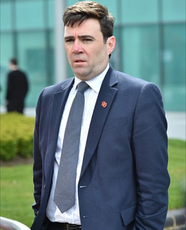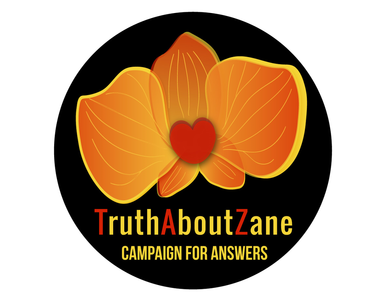 Shadow Home Secretary Andy Burnham, right, pictured with Zane's parents Kye Gbangbola and Nicole Lawler, has since attacked the 'seriously flawed inquest'
Shadow Home Secretary Andy Burnham, right, pictured with Zane's parents Kye Gbangbola and Nicole Lawler, has since attacked the 'seriously flawed inquest' - Coroner ruled Zane Gbangbola, seven, killed by carbon monoxide
- His parents Nicole and Kye were accused of leaving petrol pump running
- But they believe he was poisoned by cyanide firemen detected in home
- Shadow Home Secretary has attacked the 'seriously flawed' inquest
- And experts say not enough carbon monoxide in his blood to kill him
But after losing their seven-year-old son Zane, Nicole and Kye Gbangbola learnt to their horror that they were being blamed for his death by the authorities for using a petrol pump emitting toxic carbon monoxide to clear water from their flooded home.
Yet the couple from Surrey insisted there was a very different explanation for the tragedy: the hydrogen cyanide firemen had detected inside the house.
For two years they battled to establish the truth – only to be left devastated when earlier this month a coroner found the pump was to blame.
But now the parents have been given new hope, after Shadow Home Secretary Andy Burnham launched an outspoken attack on the inquest – branding it ‘seriously flawed’.
Accusing the coroner of failing to call key witnesses, Mr Burnham said there had been an obvious attempt to ‘discredit’ the grief-stricken couple, who deny using the pump.
He is now demanding an independent review of the case, similar to the one for which he long campaigned for for the Hillsborough families.
‘This was a flawed inquest,’ Mr Burnham told The Mail on Sunday. ‘Justice has not been served in this case.’
Floodwater rose around the outside of the family’s riverside home in Chertsey, Surrey, during the storms that battered Britain in February 2014.

They argue it was this, not carbon monoxide, that killed Zane.
Since his death the couple, both environmental experts, claim to have encountered bureaucratic secrecy and failings at every turn, with vital evidence and witnesses ignored.
And they described the verdict of senior Surrey coroner Richard Travers – who accused the Church-going couple of providing ‘inaccurate information’ while under oath – as a devastating final insult.
Today, The Mail on Sunday can reveal the key points that cast serious doubt on the inquest ruling:
- The coroner ruled that Zane had a carbon monoxide level of eight per cent in his blood when he died – but experts say death from poisoning normally occurs only at 30 per cent or above;
- Neighbours living 20 yards away never heard the petrol pump that the coroner insists was used for six hours – even though it makes a noise equivalent in decibels to a speeding express train;
- Firefighters detected a lethal level of cyanide in the house but found no carbon monoxide;
- Blood samples were not taken until three days after Zane’s death – by which time experts say cyanide gas would have left his body;
- Vital evidence, including minutes of an emergency Cobra meeting, was withheld from the inquest.
And shockingly, they were forced by the coroner to sign a gagging order threatening them with imprisonment if they shared or published recordings of the inquest hearings.
The move was blasted last night by former Crown Prosecution chief, Sir Keir Starmer, who said: ‘Open justice is a key legal principle in our country.
'To prohibit Mr and Mrs Gbangbola from using a recording of proceedings which were open to the public is unjustifiable. They have already suffered enough.’
The grieving couple’s concerns over the landfill site have been rejected for the past two-and-a-half years by the Environment Agency and the local authority, Spelthorne Borough Council. Both hired top barristers to represent them in court.
But Zane’s parents were denied legal aid and were only able to fight their case because they raised £70,000 in donations from the public.
Back in February 2014, their Edwardian riverside home was one of many in the Chertsey area ravaged by floods.
The couple cleared water from their basement with five electric pumps and only hired a petrol pump as ‘back-up’ because they feared the storm might cause a power cut.
Apart from testing it for a few minutes, they say they didn’t need to use it.
However, the coroner ruled that it was in fact switched on for six hours between 12.30pm and 6.30pm – based on notes made by a doctor who held a consultation with the couple two weeks after Zane died.
Zane’s parents insist the medic was mistaken and say they told him they had used their electric – not the petrol – pumps for six hours.
And they ask that if they had used it, why is it that a pet dog and hamster, who were downstairs all afternoon, were completely unharmed?
Zane’s lifeless body was found in bed by his distraught mother at 3.17am on February 8, 2014.
His father Kye was found by paramedics in cardiac arrest in the next room. He survived but has been left paralysed in a wheelchair.
Hospital medics informed Kye within hours of the tragedy that firefighters had detected hydrogen cyanide gas in their home, at levels which can be fatal in 15 minutes.
This was later confirmed at Zane’s inquest by fire officers. But the coroner would rule that a single reading for hydrogen cyanide was ‘insufficient’ and ruled carbon monoxide was to blame.
Zane did have carbon monoxide levels of eight per cent in his red blood cells.
Enough, according to the coroner, to kill him. But experts strongly disagree.
‘The level of carbon monoxide found in Zane Gbangbola’s system is incredibly low compared with other deaths,’ said Stephanie Trotter, president of the Carbon Monoxide and Gas Safety Society.
She checked records of carbon monoxide deaths going back to 1995 and ‘couldn’t find a single case with a level that low’.
Professor Jim Bridges, an internationally respected toxicologist, told the inquest that 30 per cent or above usually causes death.
But the coroner decided to rely on another medical expert hired by Spelthorne Borough Council, who claimed deaths can occur at just three per cent.
Experts told the inquest heavy flooding could have disturbed deadly gases from historic waste dumped at the landfill site decades ago.
An entry in Nicole’s medical notes from February 8, 2014 says: ‘[Health protection practitioner] called to advise we need to ensure patient does not return to her home.
‘Check hydrogen cyanide levels in blood as HPA [Health Protection Agency] identified small pockets of hydrogen cyanide at home.’
Remarkably, the coroner did not call a single witness from the Health Protection Agency (now known as Public Health England) to give evidence at the inquest.
In his ruling, the coroner ultimately dismissed cyanide as a cause of Zane’s death because laboratory tests of his blood and liver tissue came back normal.
But the inquest heard the samples were not taken from Zane’s body until three days after his death – and were not tested until three months later.
A report by Dr Norman Parker, a consultant haematologist and medical director, said cyanide leaves the body within hours of death.
Zane’s mother Nicole said: ‘We are devastated with the coroner’s verdict. We were expecting a full and fearless investigation.
'But instead what we got was a miscarriage of justice where any evidence of hydrogen cyanide was marginalised and anything that supported the petrol pump theory was magnified.
'We have been made out to be liars and responsible for killing Zane. Nothing could be further from the truth.’
A spokesman for Mr Travers said: ‘All relevant and available evidence was called and considered.’
ANDY BURNHAM: WHY WAS THE FAMILY DENIED LEGAL AID? Comment by Andy Burnham, Shadow Home Secretary:
I first met Zane’s family at a meeting in Westminster following the historic inquest earlier this year which finally delivered justice after 27 years for the families of those who died at Hillsborough.
I wanted MPs to confront a simple question: what changes to the law did we need to make inquests fairer for the bereaved?
We heard how families had been denied legal aid and were forced to spend their life savings and even borrow large sums in the quest for the truth.
In the questions at the end, a woman told Margaret Aspinall, the leading campaigner whose son James died at Hillsborough: ‘The injustice you faced is still happening today. My son’s inquest is due to start in a few weeks.
'Public bodies are involved and they have got QCs to represent. But we have been denied legal aid.’
Mr Burnham wants an end to families feeling like they are 'on trial' at inquests
Straight away, I saw in Nicole Gbangbola the same dignified determination that was the hallmark of the Hillsborough families.
A few days later, I met Nicole and Kye and heard about the tragic death of Zane. My alarm bells started ringing.
Given that so many public bodies were involved, how could this family have been denied legal aid?
But worse was to come at the inquest. Witnesses crucial to the family’s case were simply not called. Evidence relating to the family’s concerns about cyanide from a local landfill was ruled out.
One of the QCs even admitted in open court that his aim was to ‘discredit the family’.
I am not in a position to say what the truth about this case is. But once again an inquest leaves a bereaved family feeling like it was they who were on trial.
The sad fact is that, in 2016, bereaved families are no better protected than the Hillsborough families in 1990.
As a result, new injustices are being created all the time.
That’s why I am campaigning for the proposed new Hillsborough Law. This would compel public officials, and their QCs, to be truthful and open at inquiries.
And it would guarantee equal legal funding when bereaved families are up against the state.
Later this year I will invite the Gbangbolas to Parliament to speak in support of this law.
I want the British Establishment to hear the impassioned call of these decent, ordinary people: Stop putting us on trial.



 RSS Feed
RSS Feed